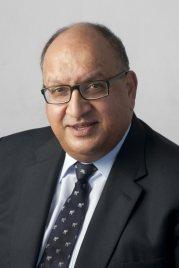Home-Our Changing Indian Heritage
- The Diwali Festival
- Going Back to India
- Introducing Harsh Shah
- Mumbai the Home of Bollywood
- My Life in India
- Raksha Bandhan
- A survey of our Indian Students' favourite sports
- A survey of the Favourite Foods of our Indian Students
- An interview with our Governor-General the Hon Anand Satyanand
- Our Rangoli Workshop
- On Being a New Immigrant
- An interview with Mr Bassi: Our Head of Science
- My Family's Story
- My Fijian Indian Heritage
- Our team
- Research process
- Learning outcomes
- References and acknowledgements
An interview with our Governor-General the Hon Anand Satyanand
Interview with our Governor General the Rt Hon Sir Anand Satyanand, GNZM, QSO
by Harsh Shah
I wrote to our Governor General the Honourable Anand Satyanand. Like us, he was educated at a Catholic School with a Marist Connection, Sacred Heart College. We were keen to find out what his views were on the importance of Indians maintaining their culture and heritage after moving to New Zealand. We also wanted to know what we as young Indians could do to help keep our Indian culture alive.
Like many Indian new Zealanders our Governor General’s family had a stop off in another country, in this case Fiji, before arriving in New Zealand.
I am very grateful to the Governor General for responding to our questions as we know he is a very busy man. And I am proud that an Indian has made his way up into Government House and is playing such a vital role in New Zealand. He is a great role model for us.
Here are the two questions I asked him and his replies.
How important do you think it is for Indians to maintain their culture and heritage after moving over to New Zealand?
Since being appointed as Governor-General in August 2006, a key issue I have emphasized has been the challenges and opportunities inherent in New Zealand’s increasing cultural, ethnic and religious diversity. The last census found that about 23 percent of New Zealanders were born overseas, which is high by overseas standards.
Moving to another country can be a difficult transition for many migrants. Some people are refugees who are fleeing their home. Others have simply decided to move to another country for educational, work and family opportunities. Regardless of the motives that made them decide to move, all are seeking a better life and opportunities for themselves and their children. This is something of which I have a keen understanding as my grandparents were born in India and migrated to Fiji where my parents were born. My parents later migrated to New Zealand where my brother and I were born.
It is important for ethnic groups to maintain their culture and heritage when emigrating . For those initial migrants it provides a foundation as they integrate themselves in their new home and learn of the customs and culture of New Zealanders.
For the children and grandchildren of those migrants, to whom New Zealand has always been their home, maintaining an understanding of their culture gives them a better understanding of their heritage. It also gives an insight into the struggles, hopes and achievements of those who have gone before them. In the case of those of Indian ancestry, it provides a window to an ancient civilization and culture and into a modern nation that is retaking its place as a leader in Asian and world affairs.
What advice do you have for young Indians to assist this?
There are many ways that young new Zealanders of Indian ancestry can maintain their culture and heritage. They can talk to their parents or grandparents about their Indian ancestry and, if possible, take the opportunity to visit the land of their ancestors in the future. Several books have also been written recently about the lives of Indian migrants to New Zealand and they provide a rich source of information about their lives and achievements. There are also several newspapers and radio stations providing news and information specifically for those of Indian ancestry. There are also many longstanding community and sporting groups established by Indian migrants to New Zealand and joining one or more of them will provide an opportunity to build and maintain links with the Indian community.
Culture and heritage can be expressed in many ways through music and dance and literature but also through conversation and food. One does not need to take it all on, just those things that one feels comfortable with. In our family there is a connection with Indian food being made and enjoyed, participation in some festivals like Diwali and in my case, some attempt to speak simple Hindustani.





